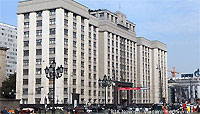For Russia, size matters; Why some lawmakers want to make promoting separatism illegal

(Moscow News – themoscownews.com – Anna Arutunyan – November 21, 2013)
Anna Arutunyan is an editor and correspondent at themoscownews.com
Earlier this month, a lawmaker known for his loyalist legislative proposals introduced a bill that would criminalize even talking about separatism in Russia.
In an apparent attempt to emulate the law that bans promotion of non-traditional sexual relations among minors, Yegveny Fyodorov, a deputy of the pro-Kremlin United Russia party, proposed, alongside two other lawmakers, making the promotion of separatism a crime punishable by up to six years in prison. If separatism is promoted in the media, the punishment could be up to 20 years.
There’s little evidence that the legislation will pass. For one thing, fellow United Russia member Pavel Krashennikov, who heads a State Duma legislative committee, has already criticized the proposal for being excessive, which is usually a signal to ultra-loyal deputies that they need to curb their enthusiasm.
But the interesting thing about this proposal and others like it is that they unwittingly express some of the government’s most pressing anxieties. The gay promotion ban, for instance, isn’t as much about homophobia among officials (Russian officials are not particularly homophobic) as it is about patriotism and the desire to unite people against a common enemy, while the ban on American adoptions was rationalized by its supporters as a way to “force” Russia’s dysfunctional foster care system to get its act together. In a bid to demonstrate their loyalty, lawmakers will go for provocative measures to try to solve problems that can’t be solved by the government in the first place.
The threat of separatism, meanwhile, is more dire than meets the eye.
Following the breakup of the Soviet Union, the government faced two bloody separatist insurrections, both of them in Chechnya. President Vladimir Putin’s administration, for lack of a clear-cut ideology, has credited itself with reining in separatism after the tumultuous 1990s.
The way the government and its supporters see it, Putin’s first two terms were first and foremost about making sure that the country remains in existence. The state credits itself with a lot of things, but counts keeping the country together as a major achievement.
And the government’s preoccupation with this issue should not be brushed off as protectionist paranoia.
Russia, historically, has been touchy about what it perceives as a foreign threat unnamed forces that seek to tear it asunder. This mentality of a country under siege has been the ideological justification for everything from a crackdown on protesters (Putin blamed the U.S. State Department for protest activity) to the gay promotion ban.
It may look like the Kremlin is battling boogeymen, but the separatist threat is actually very real, and it has a name: Russia’s size.
The enormity of Russia is the elephant in the room from which its major problems stem. The threat of separatism is not just about the conflict in Chechnya. It’s as much about the country’s lack of road infrastructure, a problem that is a function of Russia’s size, climate and economy. If that weren’t enough, it’s also about the very identity of Russia as a multinational state and if keeping one sixth of the world’s landmass intact is a challenge, consider the fact that this landmass currently includes 21 ethnic republics with different languages and cultural identities.
The draft proposal was introduced soon after supposed calls for separatism that came in response to last month’s ethnic unrest in Moscow and the resulting rise in nationalist sentiment. Russian nationalism, in that regard, is viewed as a separatist problem: and Putin himself said as much in his address to the nation last year.
Taken together, all of this means that the government really is under siege not from the outside, but from within. The state spends a gargantuan amount of energy dealing with the one thing that makes it great and is its own enemy at the same time: its size. Let’s keep that in mind when we complain about crazy legislative proposals.
